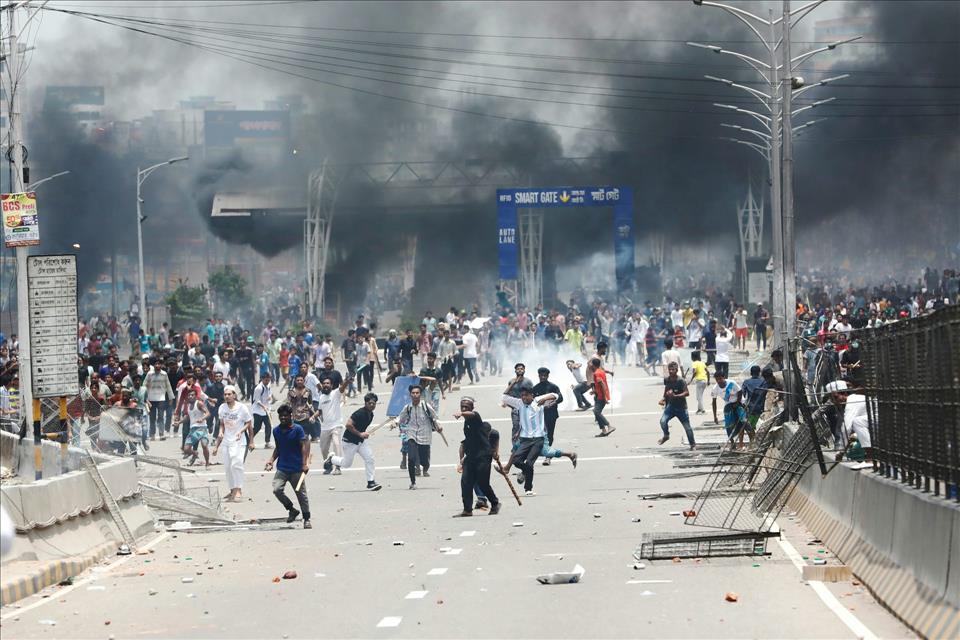
How Bangladesh's Interim Leaders Can Turn The Country's Troubled Economy Around
According to government statistics, the country's average annual growth in GDP over the past decade has been around 6.6%. Moody's ratings agency predicts that this growth will fall well below 6% for the year ending June 2025.
The interim government, which is led by Nobel laureate Muhammad Yunus, must facilitate political stability and restore law and order to put the country's economy back on track.
Read more: Bangladesh at a crossroad after Hasina's resignation – here's what could happen next
Bangladesh was already facing a series of economic challenges before the recent bout of unrest. These have included a prolonged phase of high inflationary pressure since 2022. The rate of inflation reached a 12-year high of 11.66% in July, with food inflation spiking at a record 14.1%.
This situation is set to continue. The restrictions on movement that were imposed during the unrest, as well as the disorder itself, disrupted supply chains and has led to shortages. There is no doubt that high inflationary pressure disproportionately affects low-income households.
Supply chains in Bangladesh ground to a halt during the protests. Tanjil / Shutterstock
Slow growth in job creation and unemployment, especially among educated youths , has also long been an issue in Bangladesh. Around 40% of Bangladeshi citizens aged 15 to 24 are currently classified as not in education, employment or training, which is almost double the global average.
Private sector investment in the country, which is a major creator of jobs, has been stagnant for much of the past decade. And the ongoing turmoil will deliver the investment landscape another blow.
At the same time, Bangladesh's macroeconomic situation has been on shaky ground for a while. Its reserves of foreign exchange have declined drastically, from US$48 billion (£36.6 billion) in August 2021 to just over US$18 billion (£13.8 billion) in May 2024.
The current level of reserves barely meets the minimum benchmark set by the International Monetary Fund (IMF) for countries to clear import payments.
A prolonged period of instability could cause a further deterioration , as export and remittance earnings slow . These are the two major drivers of growth in Bangladesh, having been responsible for two-thirds of the overall growth in GDP per capita between 2001 and 2020.
Restoring the economyThe interim government's main focus will be to lay the groundwork for an orderly transition to more permanent leadership. But it will also be expected to address the country's pressing economic challenges.
The immediate task is to tackle inflation. Economists in Bangladesh and the IMF have accused the central bank of failing to use monetary policy properly in recent years. For instance, interest rates were capped at 9% for lending and 6% for bank deposits between April 2020 and June 2023, despite growing inflationary pressure.
The government, which had been led by Sheikh Hasina since 2009, also borrowed heavily from the central bank in an attempt to address its dismal performance in mobilising revenue. However, borrowing from the central bank usually stokes inflationary pressure as it puts more money into circulation.
A new governor of the central bank, eminent economist Ahsan H. Mansur, has taken over and expectations are high about the bank fulfilling its due roles.
But many of the challenges facing Bangladesh's economy are structural. In the banking sector , for example, reforms are needed to address issues such as very high default rates on loans, poor governance and inadequate risk management practices.
Data from the Bangladesh Bank shows that approximately 11% of loans are subject to late repayment or are not repaid at all – with the actual amount likely to be twice as high .
There needs to be better transparency and more regulatory oversight to ensure that banks adopt sound financial practices . The interim government has announced that it will soon form a banking commission to address these issues.
Tax revenue collection in Bangladesh is also much lower than it is in other countries with a similar level of development. The new government will need to broaden the tax base , improve tax compliance, and enhance the efficiency of tax collection.
These reforms should allow public expenditure to increase. Public spending in Bangladesh has been considerably lower than similar countries over recent years, at around 15% of GDP .
This has, in part, been the result of widespread corruption. During Hasina's 15 years in power, nearly US$150 billion (£115 billion) was siphoned out of the country . US-based thinktank Global Financial Integrity, found that most of the stolen funds came from loans taken from banks, largely by politically influential people and businesses.
Hasina's government faced numerous allegations of corruption. Sk Hasan Ali / Shutterstock
And finally, Bangladesh needs to move away from its current reliance on its garment industry. Ready-made garments are by far the biggest export industry in the country, accounting for 85% of all export revenues.
But diversifying the export base will be no easy feat. Bangladesh is scheduled to graduate from the UN's least developed countries list in 2026. As a result, the country will probably no longer benefit from the trade preferences it currently receives in many countries, such as zero duties on its exports.
On top of this, the country attracts very little inward foreign investment. To make Bangladeshi businesses a more attractive proposition for investors, the new government must take steps towards liberalising trade, relaxing investment regulations and removing structural barriers like access to finance.
But, ultimately, Bangladesh needs a stable government. This will require all political parties and representatives in the country to rally around a reformist agenda.

Legal Disclaimer:
MENAFN provides the
information “as is” without warranty of any kind. We do not accept
any responsibility or liability for the accuracy, content, images,
videos, licenses, completeness, legality, or reliability of the information
contained in this article. If you have any complaints or copyright
issues related to this article, kindly contact the provider above.


















Comments
No comment